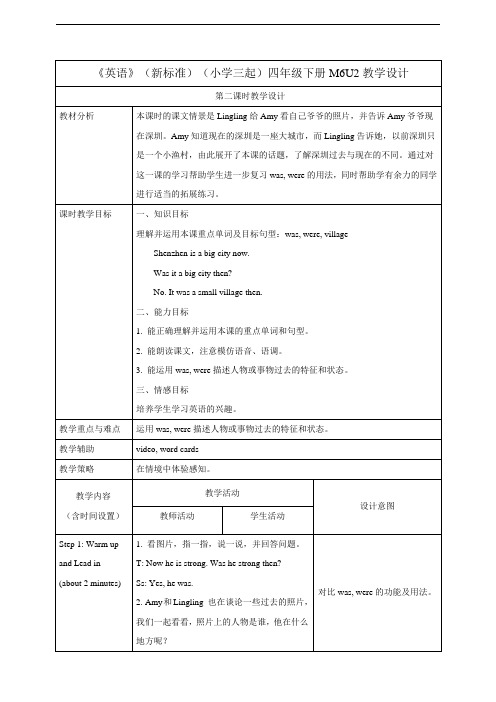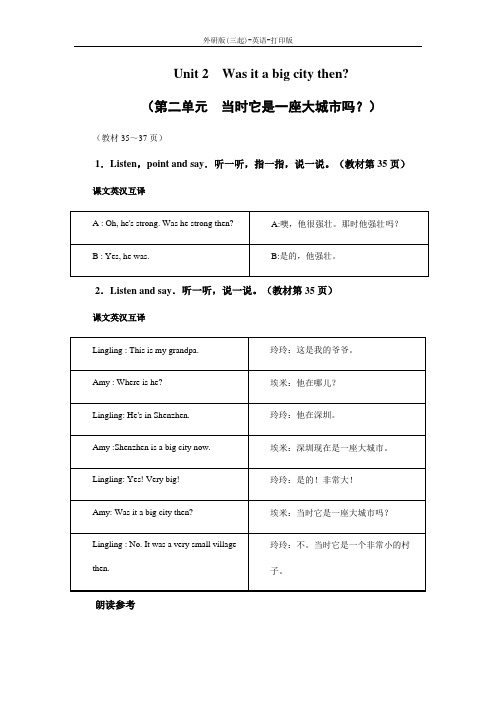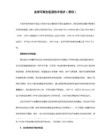(外研版 三起)四年级英语下册Module 6《Music》Unit 2 教案
- 格式:doc
- 大小:29.00 KB
- 文档页数:2

小学英语四年级(下)-外研版(三年级起点)-Module 6教案(2个课时)课程概述本教案是针对小学四年级学生的英语课教案,属于外研版英语教材的Module 6教案,共分为两个课时。
本教案旨在帮助学生学习有关“吃饭”的单词、短语和句子,通过阅读材料并参与交流活动,提高学生的英语口语和阅读能力。
同时,本教案也包含了一些与生活相关的内容,帮助学生更好地了解英语国家文化。
第一课时教学目标•学习有关“吃饭”的单词、短语和句子。
•学会询问和回答有关“吃饭”的问题。
•提高学生的英语口语和阅读能力。
教学重点•学习有关“吃饭”的单词、短语和句子。
•学会询问和回答有关“吃饭”的问题。
教学难点•学习有关“吃饭”的短语和句子。
•学会运用所学知识进行交流。
教学过程Step 1 自我介绍(5分钟)老师与学生进行自我介绍,然后与学生谈论吃饭的习惯。
Step 2 讲解(15分钟)老师通过幻灯片和短片,向学生介绍有关“吃饭”的单词、短语和句子,让学生理解并记忆。
Step 3 读物(20分钟)老师向学生发放读物,让学生自行阅读。
在阅读过程中,学生可以在书的旁边标注自己不理解的单词并在阅读结束后与同桌讨论。
老师向学生播放“英国的家庭饮食习惯”有关的视频,并与学生一起观看和解析。
Step 5 交流(20分钟)老师与学生进行口语交流和互动练习,学生可以与同桌或老师进行对话,之后在班级中展示一下交流内容。
Step 6 总结(10分钟)总结本堂课所学习的内容,让学生归纳并记忆。
课后作业•复习本节课所学习的内容并记忆有关“吃饭”的单词、短语和句子。
•与家人谈论英国和中国的饮食文化差异,并写一篇50字左右的小作文,阐述你的观点。
第二课时教学目标•学习有关“吃饭”的单词、短语和句子。
•学会询问和回答有关食品品质和文化的问题。
•提高学生的英语口语和阅读能力。
教学重点•学习有关食品品质和文化的单词、短语和句子。
•学会询问和回答有关食品品质和文化的问题。


Unit 2 Was it a big city then?(第二单元当时它是一座大城市吗?)(教材35~37页)1.Listen,point and say.听一听,指一指,说一说。
(教材第35页)课文英汉互译2.Listen and say.听一听,说一说。
(教材第35页)课文英汉互译朗读参考新词速记village/vilidʒ/n.(名词)乡村,村子短语:in a village在一个村子里例句:It is a small village.它是一个小村子。
即学即用根据汉语提示完成句子There are many trees in the ______ (村子).答案速查:village重难点精析辨析village,town与cityShenzhen is a big city now.深圳现在是一座大城市。
词语辨析village指小的村子、村庄。
例如:There are some small houses in the village.在这个村子里有一些小房子。
town意为“城镇”,比village“村庄”大,但称不上是city。
town一般和country( side)“乡下”相对应。
例如:There is a hospital near the town.在这个城镇附近有家医院。
city指较大的、较重要的城市,但在美国,city用得较广,市镇也称为city。
例如:I like the city. It's very beautiful.我喜欢这座城市。
它很美丽。
即学即用Beijing is a big ______.A. villageB. townC. city答案速查:C3.Point,ask and answer.指一指,问一问,答一答。
(教材第36页)课文英汉互译操作练习4.Listen and say.Then sing.听一听,说一说。
然后唱一唱。
(教材第36页)课文英汉互译5.Ask and answer.问一问,答一答。

教学设计:外研版英语四年级下册Module 6 Unit 2 Was it abig city then?教学目标:1. 能够听懂、会说、会读本课的生词和重点句子。
2. 能够运用一般过去时描述过去和现在的不同。
3. 能够通过图片和文字资料,了解过去和现在的城市变化。
4. 培养学生的观察能力、思维能力和表达能力。
教学内容:1. 生词:big, small, city, road, house, shop, school, hospital, factory, then, now。
2. 重点句子:Was it a big city then?No, it wasn't. It was small.Was there a road?No, there wasn't.Was there a hospital?Yes, there was. It was small.How is the city now?It's big now.教学重点与难点:1. 重点:能够听懂、会说、会读本课的生词和重点句子,能够运用一般过去时描述过去和现在的不同。
2. 难点:一般过去时的运用,以及能够通过图片和文字资料,了解过去和现在的城市变化。
教具与学具准备:1. 教具:PPT、图片、文字资料。
2. 学具:课本、练习本、文具。
教学过程:Step 1: 热身(5分钟)1. 教师与学生用英语进行简单的交流,营造轻松的课堂氛围。
2. 学生听录音,模仿语音语调。
Step 2: 引入(10分钟)1. 教师通过PPT展示两张城市的老照片和新照片,引导学生观察并思考:“Can you guess which one is the city then and which one is the city now?”2. 学生回答问题,教师引导学生用一般过去时描述过去和现在的不同。
Step 3: 生词教学(10分钟)1. 教师通过PPT展示本课的生词,引导学生跟读,强调发音和语调。


Module 6 MusicUnit 2 Lingling is better than Daming.一、教学目标1.熟练运用句子:Lingling is better than Daming.Amy is worse than Sam.2.每人抄写一段对话,小组内进行比较,然后评出书写冠军。
二、教学程序(一)、热身A. Songs: London Bridge is falling down.B. Free talk: let 2 students sing songs, and talk about them. (二)、导入Ask students: “Do you like music?” Today we will learn about music. Write the title “Unit 2 Lingling is better than Daming.”on the blackboard.(三)、课文教学1、Write“Chinese music and pop music” on the blackboard.Talk about “ wha t is Chinese music and what is pop music.”2、Write them on the blackboard. (erhu zither and piano guitar drums violin)3、Let Ss make sentences and act. For example: I can play the erhu. (The student do the actions and say.) (Must write “the”before th e instrument) Then ask Ss: “What music do you like?”“What can you play?”“Can you play the zither?”4、Choose two Ss whom can play the same instrument, Let them play or act and then we talk about “who is better? and who is worse?”5、Listen to the tape and practise reading this lesson.6、Listen to the tape and learn to sing the new song.Listen to music more times, and then try to sing the song together. (四)、练习)1、Free talk. Let Ss sing the song in groups, and we talk which group is better.Let Ss do the actions for the song, and we talk which group is better or worse.2、完成运用任务1:SB第二单元活动33、完成运用任务2:SB第二单元活动51、完成运用任务3:每人抄写一段对话,小组内进行比较,然后评出书写冠军。
外研社(三起)四年级英语第三册:Module 6 Abilities Unit 2Yes I can 教案教学目标•能够听懂、口头表达并理解Yes, I can. Yes, I can’t.•能够拼读并运用单词:sing、dance、draw、swim、speak、run、jump、clap。
•能够回答Can you…的问题。
教学准备•教材:外研社(三起)四年级英语第三册。
•工具:音乐、图片、动画、课件。
教学步骤1. 导入新课工具:音乐。
引入新课前,老师可以播放一首与主题相关的歌曲,如“Head, Shoulders, Knees and Toes”,用以引起学生对新课的兴趣,并创造了轻松的学习氛围。
2. 学习新单词工具:图片、动画、课件。
老师可以利用图片、动画、课件等工具,以直观的方式展示新单词。
在展示的同时,引导学生跟读,并强调单词的发音。
学生可以在老师的指导下,模仿老师的发音并练习。
3. 听说训练工具:课件、音频。
让学生听录音,并通过与图片的对应来识别并记忆单词。
接着,让学生模仿录音,与同桌进行语言交流,并使用Yes, I can或Yes, I can’t来回答Cany ou…的问题。
4. 练习巩固工具:练习册、作业。
在课堂上,老师可以分别给学生分发课本或练习册中的练习,并以小组形式让学生互相练习。
此外,老师也可以布置一些作业,让学生在更长时间的练习中巩固所学内容。
教学重点和难点•学习新单词并掌握单词的发音。
•通过Can you…的问题,训练听力和口语表达能力。
教学评估通过课堂教学和学生的作业等形式进行评估。
评估的内容分为听说读写四个方面:•听:学生能否听懂Yes, I can和Yes, I can’t,能否听懂录音。
•说:学生能否用句式Can you…来询问他人的能力,能否通过回答Yes, I can或Yes, I can’t来回答问题。
•读:学生是否能够准确拼读所学单词。
•写:学生是否能够书写所学单词,并在语境中正确使用。
外研版三起四年级英语下册Module 6《Music》Unit 1 教案教学目标1.学生能够听懂、学会并唱好歌曲《How are you》。
2.学生能够理解并应用单词和短语,如music、sing、dance、song、by the way、today等。
3.学生能够在正确的语音和语调下用英语介绍自己喜欢的音乐。
教学重点1.歌曲《How are you》的学习。
2.单词和短语的理解和应用。
3.自我介绍及喜好音乐等方面的能力。
教学难点1.学生学会歌曲《How are you》的发音、语调和语音。
2.学生能够在正确的情境下使用单词和短语。
3.学生能够用英语简单自我介绍及表达自己喜欢的音乐。
教学内容及过程教学内容1.用歌曲《How are you》来学习英语发音、语调和语音,并加入舞蹈动作,让学生在欢快的氛围中学习英文。
2.学习单词和短语,如music、sing、dance、song、by the way、today等。
3.教学生用英语简单自我介绍,并表达自己喜欢的音乐类型。
教学过程歌曲学习1.首先,播放歌曲《How are you》,让学生先听一遍,感受歌曲的意境。
2.然后,再放一遍歌曲,让学生一起跟唱,并加入相应的动作。
如哼唱、拍手、跳舞等。
3.学生分组进行唱歌对抗,为增加他们的表现欲望,让他们选一个代表进行比赛,得分最高的一组获胜,并给予一定的奖励。
单词和短语学习1.首先,教师以图片或实物形式教授单词和短语的基本含义,并进行操练。
2.创建一些情境,鼓励学生进行语言互动,让他们在裁判或模拟情境中进行模拟对话,运用单词和短语。
3.以教师和学生、学生和学生之间的互动方式进行教学,让学生在真实的情境中学习单词和短语。
自我介绍及喜好音乐方面的能力1.教师向学生展示一份自我介绍的范文,并让学生模仿并编写自己的自我介绍。
2.教师引导学生就自己喜欢的音乐类型进行表述,并让他们提前准备好,以便在课堂上进行展示。
3.分组进行音乐比较,让学生较量自己喜爱的音乐类型,并就自己的喜好进行表述。
外研版四年级下册英语Module 3《Unit 2 On Monday I'll go swimming》教案教材分析:本单元是外研版(三起)四年级下册的第三模块,第二单元Unit 2 On Monday I'll go swimming,主要围绕学生在将来某一天的计划展开。
通过学习本单元,学生将学会运用英语表达自己在将来某一天可能要去做的事情,并了解中西方文化在星期起始日上的差异。
教学目标:1. 学生能在语境中正确运用核心词汇:Sunday, Monday, Tuesday, Wednesday, Thursday, Friday, Saturday, week, holiday, play with friends, do homework, help mother。
2. 学生能在语境中正确运用核心句型“What will you do on...?”和“...”能进一步熟练运用句型“on...”句型表达自己在将来某一天可能要去做的事情。
3. 学生能通过本课学习学生能懂得合理规划时间,有计划地做事情,同时了解好友的计划,促进相互了解,培养学习兴趣。
4. 学生能初步认识到中西方文化的差异,在西方国家周日是一周的第一天,在中国周一是第一天。
教学重点和教学难点:重点:核心词汇的运用,句型“What will you do on...?”和“...”的正确使用。
难点:培养学生合理规划时间和制定计划的能力,了解中西方文化差异。
学情分析:学生是四年级的学生,已经具备了一定的英语基础,能够进行基本的英语交流。
他们对将来某一天的计划有一定的认知,但可能在表达上还存在一些困难。
此外,学生对中西方文化的差异可能还不太了解。
教学过程:Step 1: Warm-up1. Greet the students and ask them about their favorite day of the week.Teacher: "Good morning, class! I hope you're all having a great day. Let's start by talking about your favorite day of the week. Raise your hand and tell me, 'What's your favorite day of the week?'"Student 1: "My favorite day is Saturday because I can play with my friends."Student 2: "I like Sundays because I can relax at home."2. Introduce the topic of the lesson by asking the students,"What will you do on Monday?"Teacher: "Now, let's talk about Monday. What do you usually do on Mondays? Raise your hand and share with the class."Student 3: "On Monday, I have swimming class."Student 4: "I do my homework on Mondays."3. Encourage students to share their plans for Monday and ask follow-up questions to generate discussion.Teacher: "Thank you for sharing! That sounds like a fun activity and a responsible plan. Who else wants to share their plans for Monday? And can you ask a question to your classmate about their plans?"Step 2: Presentation1. Present the target vocabulary: Sunday, Monday, Tuesday, Wednesday, Thursday, Friday, Saturday, week, holiday, play with friends, do homework, help mother.Teacher: "Now, let's learn some new words related to our topic. Look at the board (or show flashcards) and repeat after me."Teacher: "Sunday, Monday, Tuesday, Wednesday, Thursday, Friday, Saturday."Teacher: "Week, holiday, play with friends, do homework, help mother."2. Use flashcards or visuals to introduce the vocabulary and elicit the pronunciation and meaning from students.Teacher: "Here are some flashcards with the days of the week. Can you say the name of each day when I show you the flashcard?"Teacher shows the flashcards one by one, and students respond by saying the names of the days.3. Drill the vocabulary with the whole class and individual students, ensuring correct pronunciation and understanding.Teacher: "Now, let's practice saying the days of the week together. Repeat after me: Sunday, Monday, Tuesday, Wednesday, Thursday, Friday, Saturday."Step 3: Practice1. Introduce the sentence pattern "What will you do on...?" Explain that this sentence structure is used to talk about future plans.Teacher: "We can use a special question to talk about our plans for specific days. Listen carefully: 'What will you do on Monday?' This question asks about your plans for a particular day. Let's practice saying it together."Teacher and students: "What will you do on Monday?"2. Model examples using the sentence pattern and ask students to repeat after you.Teacher: "On Monday, I will play with my friends. What will you do on Monday?"Students: "On Monday, I will do my homework."3. Divide the class into pairs or small groups. Ask students to take turns asking and answering questions about their plans for different days of the week using the sentence pattern.Teacher: "Now, I want you to work in pairs. Ask your partner, 'What will you do on Wednesday?' and your partner will answer. Then switch roles. Practice using the sentence pattern we just learned."Step 4: Listening and Speaking1. Play an audio recording or read aloud a dialogue abouta student's plans for the week.Teacher: "Listen carefully to this dialogue about Amy's plans for the week. Pay attention to the days and activities mentioned."Teacher plays the recording or reads the dialogue aloud.2. Ask comprehension questions to check understanding and encourage students to discuss the dialogue in pairs or small groups.Teacher: "Now, let's discuss the dialogue. What is Amy's plan for Monday? Talk to your partner and share your answers."Students discuss in pairs or small groups and share their answers.3. Pair students up and have them create their own dialogues using the sentence pattern and the vocabulary they have learned.Teacher: "Now, with your partner, create your own dialogue about your plans for the week. Use the sentence pattern and vocabulary we've practiced. Take turns asking and answering questions. Be ready to share your dialogues with the class."Step 5: Cultural Awareness1. Introduce the cultural difference between Western countries and China regarding the starting day of the week (Sunday vs. Monday).Teacher: "Did you know that different countries have different ways of counting the days of the week? In Western countries, Sunday is considered the first day of the week, while in China, Monday is often considered the first day of the week."2. Show pictures or use visual aids to help students understand the concept and emphasize the cultural diversity.Teacher: "Look at these pictures. In Western calendars, Sunday is shown as the first day of the week, while in Chinese calendars, Monday is shown as the first day. This is aninteresting cultural difference."Teacher shows pictures or visual aids depicting Western and Chinese calendars.3. Facilitate a short discussion about the cultural differences and ask students to share their thoughts and experiences related to this topic.Teacher: "What do you think about this cultural difference? Do you prefer starting the week on Sunday or Monday? Share your thoughts with the class."Students share their opinions and experiences related to the cultural difference, fostering a brief discussion.Step 6: Consolidation1. Review the target vocabulary and sentence pattern by conducting a quick quiz or game.Teacher: "Let's review what we've learned so far. I will say a day of the week, and you tell me the activity you would do on that day. For example, if I say 'Sunday,' you can say 'play with friends.' Are you ready?"Teacher asks questions like "What will you do on Monday?" and students respond with appropriate answers using the target vocabulary and sentence pattern.2. Ask students to write down their plans for the week usingthe sentence pattern "On [day], I will [activity]."Teacher: "Now, take out your notebooks and write down your plans for the week. Use the sentence pattern we've practiced. Start each sentence with 'On [day], I will [activity].' Take your time and be creative with your plans."Students write their plans individually.3. Provide feedback and correct any mistakes or misunderstandings.Teacher circulates the classroom, checks students' written plans, and provides feedback. If necessary, the teacher corrects any mistakes or clarifies any misunderstandings.Step 7: Summary and Reflection1. Summarize the key points covered in the lesson, including the vocabulary, sentence pattern, and cultural awareness.Teacher: "In today's lesson, we learned about the days of the week, future plans using the sentence pattern 'What will you do on...?' and the cultural difference between Western countries and China regarding the starting day of the week."Teacher briefly recaps the target vocabulary, sentence pattern, and cultural awareness.2. Ask students to reflect on what they have learned andshare any new insights or understanding they gained.Teacher: "Now, take a moment to think about what you've learned today. Can you share one thing you found interesting or one new thing you learned?"Students reflect and share their insights or new learnings with the class.3. Provide positive feedback and encourage students to continue practicing their English skills.Teacher: "Great job, everyone! I'm impressed with your participation and progress. Keep practicing your English skills, and I'm sure you'll become even better. Have a wonderful day!"板书设计:Sunday Monday Tuesday Wednesday Thursday Friday SaturdayWhat will you do on...?On [day], I will [activity].教学反思:本节课通过多种教学活动,如词汇教学、句型练习、听说训练和文化意识培养等,帮助学生学会运用核心词汇和句型,能够在语境中表达自己在将来某一天的计划。
Module 6 Music
Unit 2 Lingling is better than Daming.
一、教学目标
1.熟练运用句子:Lingling is better than Daming.
Amy is worse than Sam.
2.每人抄写一段对话,小组内进行比较,然后评出书写冠军。
二、教学程序
(一)、热身
A. Songs: London Bridge is falling down.
B. Free talk: let 2 students sing songs, and talk about them.
(二)、导入
Ask students: “Do you like music?” Today we will learn about music.
Write the title “Unit 2 Lingling is better than Daming.”on the blackboard. (三)、课文教学
1、Write“Chinese music and pop music” on the blackboard.Talk about“what is Chinese music and what is pop music.”
2、Write them on the blackboard. (erhu zither and piano guitar drums violin)
3、Let Ss make sentences and act. For example: I can play the erhu. (The student do the actions and say.) (Must write “the”before th e instrument)
Then ask Ss: “What music do you like?”
“What can you play?”
“Can you play the zither?”
4、Choose two Ss whom can play the same instrument, Let them play or act and then we talk about “who is better? and who is worse?”
5、Listen to the tape and practise reading this lesson.
6、Listen to the tape and learn to sing the new song.
Listen to music more times, and then try to sing the song together.
(四)、练习)
1、Free talk. Let Ss sing the song in groups, and we talk which group is better.
Let Ss do the actions for the song, and we talk which group is better or worse.
2、完成运用任务1:SB第二单元活动3
3、完成运用任务2:SB第二单元活动5
1、完成运用任务3:每人抄写一段对话,小组内进行比较,然后评出书写冠军。
三、板书设计
Unit 2 Lingling is better than Daming.
Chinese music Pop music
erhu guitar
zither drums
Piano
Violin。